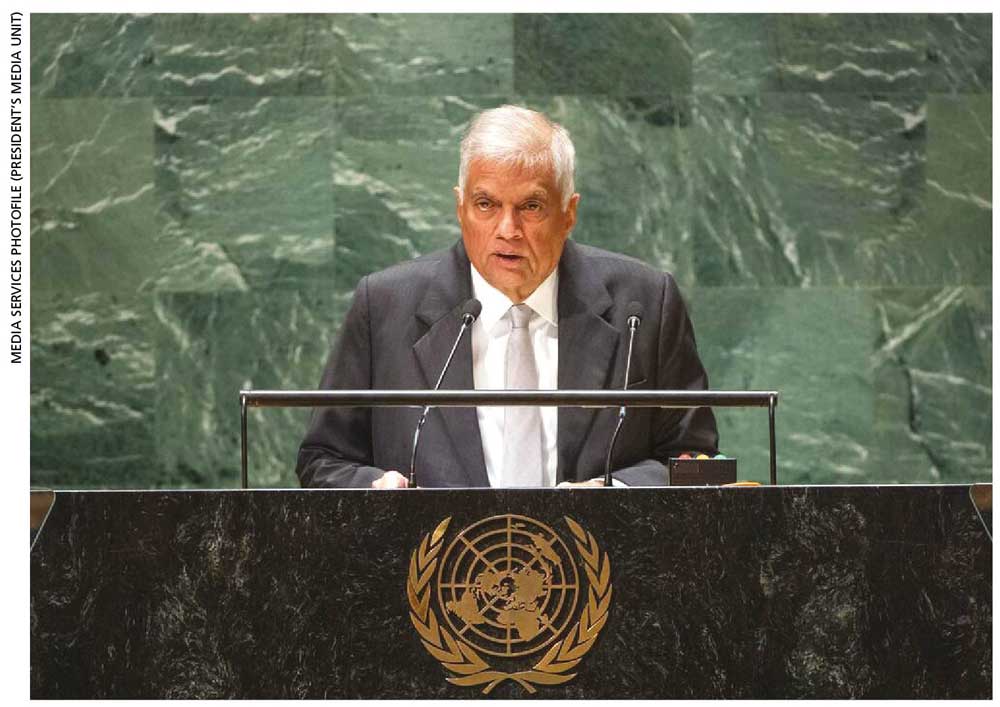FOREIGN POLICY
CHALLENGES AT HOME AND AWAY
Tamara Rebeira dissects President Ranil Wickremesinghe’s address to the UN

Ranil Wickremesinghe ticked off another item on his bucket list when he represented his country and addressed the United Nations General Assembly (UNGA) in his capacity as the President of Sri Lanka. Wickremesinghe touched on a wide range of global issues including the challenges faced by Sri Lanka and the need for international solidarity.
He boldly touched on the nation’s democratic resilience and highlighted the difficulties it faced last year – including social, economic and political upheaval. The president emphasised the importance of democratic traditions in weathering these challenges and ensuring a peaceful transition of power.
However, while acknowledging our democratic resilience, major concerns have arisen over the Online Safety Bill and newly amended Anti-Terrorism Bill. These bills are being roundly criticised both locally and internationally for their potential to further restrict civic space.
It’s also plausible that the introduction of these new bills is in part a response to public opposition from both workers and university students, triggered by austerity measures imposed by the government that have purportedly been driven by IMF directives.
But the question remains as to what extent democratic norms and institutions have been upheld, especially in light of political controversies and human rights concerns that have repeatedly been taken up at the UN. And if anything, the recent DW interview with the president would be telling of how he views the United Nations Human Rights Council’s (UNHRC) stance on Sri Lanka regarding accountability.
The president also briefly mentioned Sri Lanka’s commitment to peace and the recent ratification of international treaties related to disarmament. While it’s been 14 years since the end of the civil war, efforts toward post-conflict reconciliation – including the challenges and progress made in addressing human rights issues – remain mundane.
Sri Lanka has faced several resolutions at the UNHRC that called for investigations into alleged human rights abuses and accountability.
Government positions over the matter have varied as in certain instances, the resolutions have been rejected and support was sought from other member countries to oppose them – the contention being that they undermined Sri Lanka’s sovereignty.
However in other instances, the country has expressed a willingness to engage with the international community and address human rights concerns through domestic mechanisms.
In another part of his address, Wickremesinghe touched on economic reforms aimed at rebuilding trust between the government and the people. While all this is fine and well, the effectiveness, transparency, and inclusivity of economic reforms – and the role of the government – must be clear as daylight… but this is evidently lacking.
It’s important to assess the impact of economic reforms on different segments of the population. Most claim that austerity measures and economic policies have disproportionately affected vulnerable communities, leading to increased social and economic disparities.
Wickremesinghe also outlined Sri Lanka’s climate ambitions including goals for renewable energy, forest cover and emissions reduction.
However, as explored in LMD’s October edition, our commitment towards green promises remains unfulfilled despite climate goals being ambitious and commendable. Concrete action is yet to be taken to achieve our climate promises.
The importance of international solidarity in addressing global issues was another highlight of his speech.
Sri Lanka’s contributions to international cooperation and solidarity, including its foreign policy priorities and engagements with regional and international organisations, have been open to question. The president called for collective action to address simultaneous challenges including climate change, debt crises and conflicts.
However, the potential impact and effectiveness of Sri Lanka’s contribution to addressing these challenges on the international stage is far from clear. And prior to seeking international support, one may question the level of commitment and advocacy in mobilising and addressing challenges here at home – especially in the context of our own debt crisis.




